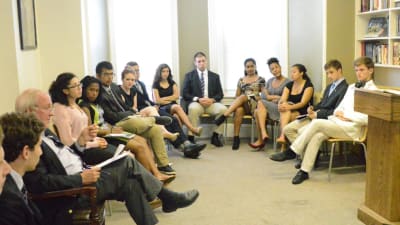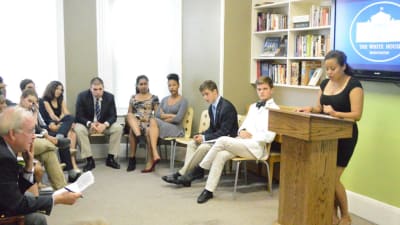Former White House Press Secretary Mike McCurry Visits SEGL for Master Class
Have you ever been put on the spot? In front of your school? With the fate of the free world at stake?
In more ways than one, that’s exactly what happened to each member of our Spring 2015 cohort in our final week of Ethics and Leadership class.
Our final week is a culmination of all our E&L learning. It starts with an introduction to social contract theory (Hobbes, Locke, and Rousseau) and key theories of international relations (realism, liberalism, neoconservatism, etc.) One key lesson from this lecture? Human beings form governments–that is, sign on to social contracts–in order to protect themselves, their rights, and their interests. This means (at least in theory) that the primary purpose of governments is to act in the interest of their citizens–not to intervene in foreign affairs that are of little interest to those citizens. (This idea always provokes discussion, for it explains why the U.S. did not intervene in Rwanda. Could it be possible that failing to intervene was the ethical choice? Or are there values more important than acting in the interest of one’s citizens?)
On Wednesday, we welcomed former White House Press Secretary Mike McCurry back to SEGL for a Master Class. McCurry was State Department spokesperson during the Rwandan Genocide and White House Press Secretary during the Monica Lewinsky affair. (The man knows how to parse a scandal!) He also currently co-chairs the Commission on Presidential Debates.
A day before, in groups of four, our students received briefings on almost-real crises facing an imaginary White House. Here are summaries:
King Salman Skips Camp David Summit
The White House is convening a meeting of the Gulf Cooperation Council (GCC) on Thursday at Camp David. This six-nation body includes Saudi Arabia, Kuwait, Oman, Bahrain, the UAE and Qatar. On Friday, the White House announced that King Salman of Saudi Arabia would attend the meeting; over the weekend, however, the Saudi foreign minister said that the King would not attend. Instead, the Crown Prince would head the delegation. The White House and the Saudis have both said publicly that the move was not intended to send any political messages, but many observers wonder. Bahrain, the UAE and Oman are also sending subordinates to the meeting, which means the emirs of Qatar and Kuwait are the only GCC leaders who will actually be in attendance. WEDNESDAY: The emirs of Qatar and Kuwait, decide to cancel. Furthermore, in an early morning story, The New York Times quotes an unnamed high-ranking Saudi official as saying, “If the President is a friend to King Salman, he will end his foolish games with Iran.”
Baltimore Police Outraged at President Obama
On Friday, Attorney GeneralLoretta Lynch announced a Department of Justice investigation into the Baltimore Police Department in response to the death of Freddie Gray and the violent aftermath. The Attorney General cited a “serious erosion of public trust” as one of the reasons for the civil rights investigation, which was requested by Baltimore Mayor Stephanie Rawlings-Blake last Wednesday. This probe is similar in type to the one conducted in Ferguson, MO, which uncovered broad patterns of behavior in violation to constitutional guarantees of civil rights. WEDNESDAY: The Baltimore Sun publishes leaked DOJ documents from the early stages of the investigation in which DOJ agents condemn the Baltimore PD for racially-discriminatory practices. As a result, Baltimore PD Commissioner Anthony Batts, himself an African-American, sharply critiques President Obama, saying “he’s supposed to provide leadership to the black community, not critique me for the job I’m doing. Another example of the federal government targeting black citizens. We need to stand together here.” Commissioner Batts announced a “strategic redistribution” of police forces in Baltimore, effective Wednesday night; observers note that this “redistribution” will result in little-to-no police presence in the neighborhoods hardest hit by last month’s unrest.
U.S. Treatment of bin Laden’s Body Questioned
On Monday, the London Review of Books published a 10,000+ word article by Seymour Hersh, the Pulitzer prize-winning journalist who broke the Abu Ghraib scandal in 2004 and first reported the My Lai massacre during the Vietnam War. In his article, Hersh alleges that the Obama Administration fabricated its entire account of the military raid that killed Osama bin Laden. The article charges that the Pakistani government knew about bin Laden’s location and gave the U.S. permission to conduct the raid; furthermore, it says that even though no firefight took place, the SEAL team “had torn bin Laden’s body to pieces with rifle fire” during the operation. The article goes on to contradict the official U.S. account that bin Laden was buried at sea in accordance with Islamic law. Instead, Hersh cites reports that the SEAL team tossed parts of bin Laden’s body out of their helicopter as they left Pakistan. After the publication of Hersh’s article, the White House, the State Department, and other branches of government have denied Hersh’s allegations and confirmed the official version of the events. WEDNESDAY: While many details of Hersh’s account remain unsubstantiated, an article in Wednesday’s Washington Post anonymously quotes one of the Navy SEALs who was reportedly involved in the raid. The anonymous SEAL tells the Post: “I don’t know much about all that, but I do know that we didn’t bury that body at sea. [Bin Laden] did not deserve respect, and we sure as hell didn’t give him any.”
Each group studied these scenarios, elected a White House Press Secretary, and came to our session with McCurry excited and prepared. McCurry role-played the sometimes-vitriolic White House press corps, peppering each Press Secretary with tough, pointed, and aggressive questions for about ten minutes each.
Following each “performance,” McCurry offered both praise and advice. He also offered his “Five C’s” (read about them here) and some thoughts on the ethics of being a Press Secretary. (For example, how does one balance one’s personal views with the President’s?) During the Q and A period that followed, he offered a particularly poignant take on serving as State Department spokesperson during the Rwanda crisis.
On Friday the students put their on-the-spot skills to the test in a culminating crisis simulation. Complete with video clips, top-secret intelligence, high level negotiations, faculty role-playing, and many lessons learned, the simulation is always a highlight of the term. Each student played a different essential role in the Executive Branch, with ample opportunity to save or end lives. Though we can’t give details of the actual crisis (some elements may be repeated in future semesters!), it was wonderful to see the students collaborate and make difficult decisions under pressure.
After a final journal reading on Saturday afternoon, the students had time for some fun before plunging into preparation for finals (and final projects): they planned and took part in an anti-prom of sorts, which they dubbed “pram.”
One more week! It is hard to believe how fast the spring has gone.
















